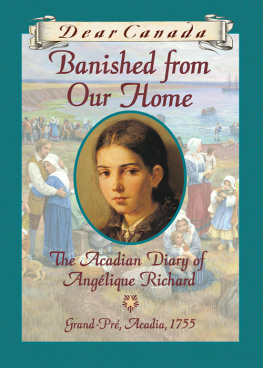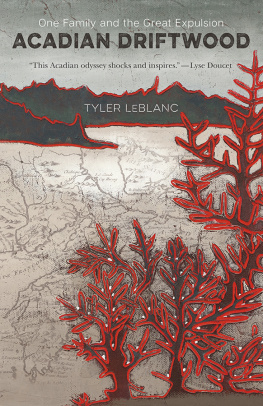Introduction
Table of Contents
Acadian Reminiscences, depicting the True Life of Evangeline, is a story centered about the life of the Acadians whose descendants are now residents of the Teche Country also known as the Land of Evangeline.
These people lived a pure and simple life with an unbounded devotion to their religion and with an unshakable faith in their God. Their love for one another is unparalleled in the annals of human history, to which may be attributed their fortitude and perseverance in their travels from Canada, upon being expelled by the British, to their chosen Land on the banks of Bayou Teche.
The author, Judge Felix Voorhies, relates the story as it was told to him by his grandmother. The story begins by telling of the native land of these Acadians and of the village of St. Gabriel from which they were driven when the French Province was surrendered to the British. It tells of members of the same families being separated and placed aboard different ships and some never to see each other again. The story tells of their landing in Maryland and after some time, hearing that members of theirs and other families having landed in Louisiana. This news brought encouragement and determination, in face of great dangers, to travel to the beautiful Land of the Teche.
The author was best able to present this story as it was handed down to him by word of mouth by his grandmother who adopted Evangeline when orphaned at an early age. The writer repeats the story in a simple narrative manner characteristic of the Acadians.
To this day travelers may visit the quaint town of St. Martinsville on the banks of Bayou Teche and pay their respects at the grave shrine of Evangeline and for a few fleeting moments live the life of these early settlers.
Because of the demands for this story and in tribute to Judge Felix Voorhies, my grandfather, a man of noble character, staunch patriotism and unerring judgment, I, together with all members of the Voorhies family, dedicate this book.
FELIX BIRNEY VOORHIES.
Acadian
Reminiscences
Table of Contents
With the true
Story of Evangeline
Table of Contents
I t seems but yesterday, and yet sixty years have passed away since my boyhood. How fleeting is time, how swiftly does old age creep upon us with its infirmities. The curling smoke, dispelled by the passing wind, the water that glides with a babbling murmur in the gentle stream, leave as deep a mark of their passage as do the fleeting days of man.
I was twelve years old, and yet I can picture in my mind the noble simplicity of my fathers house. The homes of our fathers were not showy, but their appearance was smiling and inviting; they had neither quaintness nor gaudiness, but were as grand in their simplicity as the boundless hospitality of their owners, for no people were more generous or hospitable than the Acadians who settled in the magnificent and poetical wilds of the Teche country.
My fathers house stood on a sloping hill, in the center of a large yard, whose finely laid rows of china trees, interspersed with clusters of towering oaks, formed delightful vistas. On the declivity of the hill the orchard displayed its wealth of orange, of plum and peach trees. Farther on was the garden, teeming with vegetables of all kinds, sufficient for the need of a whole village.
I can yet picture that yard, with its hundreds of poultry, so full of life, running with flapping of wings and with noisy cacklings around my mother as she scattered the grain for them morning and evening.
At the foot of the hill, extending to the Vermillion Bayou, were the pasture grounds, where grazed the cattle, and where the bleating sheep followed, step by step, the stately ram with tinkling bell suspended to his neck. How clearly is that scenery pictured in my mind with its lights and shadows! Were I a painter I could even now portray with striking reality the minutest shadings and beauties of that landscape.
How strange that I should recall so vividly those things, while scenes that I have admired in my maturer years have been obliterated from my memory! Ah! the childs mind, like soft wax, is easily molded to sensations and impressions that never fade, while mans mind, blunted by the keenness of lifes deceptions, can no longer receive and retain the imprints of those impressions and sensations.
If this be true, does not a kind Providence suggest to us, in this wise, the wisdom of molding the childs mind and intelligence with the fostering care of parental solicitude, that he may become an upright man, a good citizen and a reproachless husband and father.
My father was an Acadian, son of an Acadian, and proud of his ancestry. The term Acadian was, in those days, synonymous with honesty, hospitality and generosity. By his indomitable energy, my father had acquired a handsome fortune, and such was the simplicity of his manners, and such his frugality, that he lived, contented and happy, on his income.
Our family consisted of my father and mother, of three children, and of my grandmother, a centenarian, whose clear and lucid memory contained a wealthy mine of historical facts that an antiquarian or chronicler would have been proud to possess.
In the cold winter days the family assembled in the hall, where a goodly fire blazed on the hearth, and while the wind whistled outside, our grandmother, an exile from Acadia, would relate to us the stirring scenes she had witnessed when her people were driven from their homes by the British, their sufferings during their long pilgrimage overland from Maryland to the wilds of Louisiana, the dangers that beset them on their long journey through endless forests, along the precipitous banks of rivers too deep to be forded, among hostile Indians, that followed them stealthily, like wolves, day and night, ever ready to pounce upon them and massacre them.






 A Modern Conception of Evangeline
A Modern Conception of Evangeline











